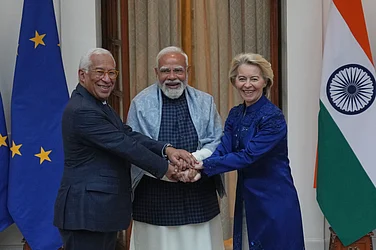Thriller Cop
It’s time to stop the traffic—and Ranjeet Singh proceeds to take a drastic step. And another. And one more. All backwards. That’s right, this is the Indore traffic policeman who’s achieved celebrity status with his Michael Jackson-inspired moonwalking. The sunglass-wearing cop decided, after the death of a friend in an accident years ago, that he had to do something special to make drivers sit up and pay attention— and he’s succeeded beyond his wildest dreams thanks to social media, with many thousands of Instagram followers. But this fame seems to have become a burden for him. “At times when I am extremely tired while doing my duty in scorching heat, some vehicle drivers ask me to show the moonwalking moves…I also experience the unnecessary burden of expectations of the people due to social media,” he was quoted as saying.

The Bloody Present
Kamakhya temple is a famous Shakti Peetha in Guwahati, and the presiding deity is revered as ‘the bleeding goddess’—a reference to menstruation, but that’s not the only bleeding that goes on here; worshippers bring animals to be sacrificed every day. Temple authorities were ill pleased when Zubeen Garg, an Assamese singer, spoke out against this recently. He voiced his protest at a Bihu function at the temple on May 28 when actor Govinda had brought a buffalo for sacrifice, saying, “Govinda should have sacrificed himself, not a buffalo. Maa Kamakhya doesn’t want the blood of animals. Stop sacrificing animals here.” The priests have demanded an apology for the ‘unwarranted’ remarks, threatening to bar the singer from the temple otherwise. But this has earned Garg plaudits from PETA, which announced that he would receive its ‘Hero to Animals Award’.

No Cup Of Tea
To go from tea seller to prime minister is impressive; to run a school using a tea stall’s proceeds is admirable. The two men in question, Narendra Modi and Devarapalli Prakash Rao, met briefly before the PM’s rally in Cuttack recently; the PM mentioned Rao on his Mann Ki Baat programme the next day and tweeted a picture of him with “some of the students whose life he is transforming,” catapulting him to instant fame. Rao’s school is a small building in an area of Cuttack largely populated by Telugu-speaking migrants, as well as a few Muslim and Christian families. Its 74 students, mostly from nearby slums, are taught by six teachers in a 150 sq ft classroom. Despite the financial burden, he continues to contribute about half the money he earns from his tea stall (about Rs 700 a day).

Sati’s Long Shadow
A widow rushes toward her husband’s funeral pyre and leaps into it in a frenzy as hundreds of onlookers scream and shout. It sickened Ibn Battuta when he had to witness it nearly 700 years ago—and it casts a grisly pall over parts of the country still. Kuttu Bai, 87, was driven to commit ‘sati’ upon her nonagenarian husband’s death 16 years ago in Patna Tamola in Madhya Pradesh’s Panna district. Several people were prosecuted and four were given life sentences, while the memory of the scene has been immortalised by negative publicity. These days, villagers are trying to atone with “community-based welfare measures” to arrange marriages for women who are widowed at a young age or are deserted by their husbands; for example, a 21-year-old ‘deserted wife’ was recently wed to a village youth under the initiative.

The Hinglish Patient
It’s the thin end of the wedge, I see the river Tiber foaming with much blood, and so forth—medical students in Madhya Pradesh now have the option of writing their examination answers in Hinglish, as the tendency to mix Hindi and English is called. According to a circular issued on May 26, Madhya Pradesh Medical University has included the option alongside English and Hindi for MBBS students as well as those in other programmes such as nursing, dentistry and ayurveda. This will also be extended to oral and practical exams; the circular states, “If a technical or scientific word is not available in Hindi, a student can use that word in English.”
Lanka’s Channel Discord
President Maithripala Sirisena came to power in Sri Lanka riding a wave of opposition to the draconian policies of Mahinda Rajapakse, including censorship of the media. Sirisena began by lifting many of these controls. After Telshan Network, owned by the family of Sirisena’s coalition partner, PM Ranil Wickremesinghe, criticised Sirisena recently, Lanka’s telecom regulator suspended it, claiming it had defaulted on licence fees. This follows the blocking of a London-based website, Lanka E News, in November after it had published an expose alleging corruption in Sirisena’s office.
Dame-Errant’s Quest
Whosoever weds 25-year-old Geeta must swear an oath in addition to the usual vows: to aid her in her quest to find her parents. The mute woman whose story was dramatised in Salman Khan’s Bajrangi Bhaijaan is yet to recover the identity that was lost after she inadvertently ended up in Pakistan aboard the Samjhauta Express 15 years ago. Now at an Indore orphanage, she has struggled to cope with her predicament. Officials feel marriage could help her get past and have launched a campaign to find a groom. Many responded to the MEA’s Facebook ad, and a few—including an engineering graduate and a priest—have been selected for individual meetings with Geeta.

A Favourite’s Millions
Pakistan Tehreek-i-Insaf chief Imran Khan, widely believed to be the Army’s choice for taking on the Sharifs in the impending July elections, seems to be a magnet for controversies. Barely has the dust settled down over a former Imran lover’s biography, the cricket icon-turned-politician has created a furore over his latest trip to Madina.
By convention, South Asian politicians often turn religious before a crucial election. Imran and his PTI hope to take on Nawaz Sharif’s Pakistan Muslim League (N) in the parliamentary elections scheduled for July-end. Though believed to be the generals’ favourite candidate, a bit of divine blessings always comes in handy. This perhaps, was the logic behind Imran’s decision to perform the Umra in Saudi Arabia, especially when Id-ul-Fitr was round the corner.
But according to a recent report in the daily Dawn, a special flight to Madina—in which Imran, his wife Bushra, PTI leaders Aleem Khan and his wife and Zulfiqar Hussain Bukhari, aka Zulfi Bukhari, were travelling—was delayed by an hour because Bukhari’s name was on the exit control list.
He was not initially allowed to travel by the Federal Investigation Agency (FIA) and immigration staff at Benazir Bhutto International Airport, which has recently been closed down after the new Islamabad International Airport became functional.
Later, the flight was allowed to leave with Bukhari on board.
According to the report, Bukhari’s departure to Saudi Arabia on June 11 shocked the National Accountability Bureau, as the anti-corruption watchdog was not informed why an accused on the Exit Control List (ECL) was allowed to leave the country.
According to a letter issued by the interior ministry, one-time “permission” was given to Mr Bukhari for six days for performing Umra, the report added.
Bukhari was accused of owning an offshore company and having assets beyond his known sources of income— the reason why he was forbidden to leave Pakistan.
But apart from Bukhari, the money being spent by Imran for his Saudi trip has also raised many eyebrows. According to Geo News, the special chartered aircraft hired by Imran costs Pakistani rupees Rs 8,00,000 per hour.
According to the channel, the total duration of his flight was 13 hours, with an estimated expense of around Rs 10 million. It certainly was a costly Umra before the elections.
Illustrations by Sajith Kumar


























